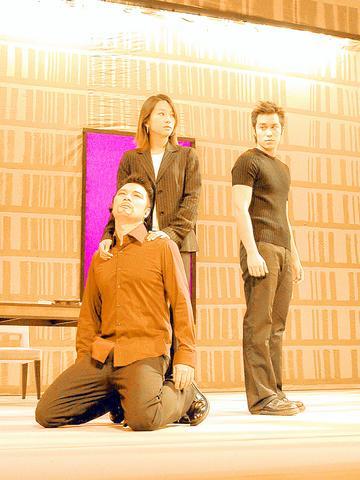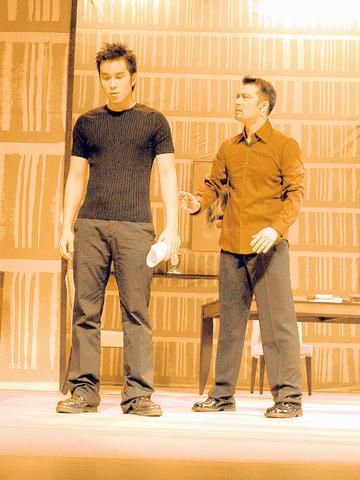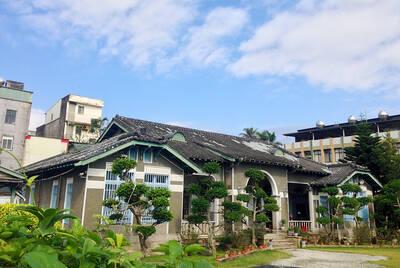Literature is the best aphrodisiac," said second-time director Kuo Chiang-sheng (
In directing the show, which he also wrote, Kuo is making a comeback on the local theater scene after a 10-year absence. Despite Kuo's NYU doctorate degree in theater, he is better known in Taiwan for his widely-acclaimed novels since winning the China Times Literature Award (
The Desired tells of the shifting relations between two literature professors and one of their students. A young female professor finds a secret that an established male professor has been hiding for years, giving her an advantage over him in the competitive literature department. The power struggle between them is further complicated by their shared desire for an ambitious and attractive male student.

PHOTO: VICO LEE, TAIPEI TIMES
Chang Hsiao-chuan (
Combining the roles of novelist, playwright, literary critic, essayist, professor and director, Kuo said he considered theater his favorite medium. However, writing and directing are closely related for him.
"From writing novels and plays, from criticism to directing, I am doing the same thing. That is, to reveal the inner worlds of people to them. We all know how amazing it is to experience something revealed to us when we are reading literature or watching a performance," Kuo said.

PHOTO: VICO LEE, TAIPEI TIMES
Kuo is known to portray people's inner world through unconventional but no less convincing characters. In The Desired, the three characters are a white male literature professor in the depth of his mid-life crisis, a young Asian female professor specializing in feminism, and an exceptionally bright and ambitious Asian male college student.
Despite their differences in age, sex, race and achievement, they are all unable to deal with their desires. Although the homosexuality and the nude scenes of the two male characters have led to some sensational coverage in the local media, Kuo sidestepped the homosexual aspects to the play. Rather, the intellectuals' failed approaches to personal desires is what Kuo wanted to talk about.
"Placing the characters in tangling relationships reveals their frailties, because a person is always naked in a relationship," Kuo said. "By presenting them in relationships, the facade of academia is torn down and our illusions about intellectuals are broken."
"The male professor, in his 50s, is one of my generation. Literature for him is what he resorts to in order to fulfill his romantic desires. With an intellectual's perfectionism, he cannot bring himself to face his desires in real life.
"The female professor, in her 30s, represents the younger-generation intellectuals who grow up and spend all their adult life inside the academic circle. They think they know everything but when it comes to the practical aspects of life, like their desires, they don't know how to deal with them," Kou said.
"The male college student is of an even younger generation of intellectuals. They have tried out various things that life has to offer before entering academia. Now he wants to test what he learned from life in the academic sphere."
Kuo originally wrote the play in English and then translated it himself into Chinese for its theater production. It was recently released by Chiuko Publishing (
First majoring in English, Kuo spent 10 years studying and working in New York before starting to write plays in English in 1999. Writing The Desired, set in the US, in English, was more than convenient, it was a cultural challenge.
"People seem to adopt the American way of thinking when they adopt the English language. What I want to do here is to think as a Taiwanese when I use the English language and talk about what happens in American society. I want to see the two cultures intermingle through this play," Kuo said. "What effects the interactions of cultures have on our cultural identity is something we may well think about in this age of accelerating globalization."
For those unused to Kuo's works, The Desired can be a difficult play, with its frequent references to various literary works and motifs of literary criticism. Kuo admitted that he never tries to write plays that cater to the taste of the general public, and the same applies to his theater productions. Instead, he wants to change the public taste and has set up You See Theater
"In Taiwan, there's a gap between popular theater and experimental theater. Literary theater productions that emphasize characterization, acting and the richness of the text are lacking. In the future, I would like to go on producing theater performances that show a literary spirit," Kuo said.
Citing movies such as Adaptation and The Hours, Kuo expressed his belief that if moviegoers can accept "literary" movies, theater-goers could also get used to "literary" theater.
"Literature, being part of popular cultural production, is the trend," Kuo said.
The Desired will be performed at
7:30pm tonight and tomorrow at Novel Hall (

From the last quarter of 2001, research shows that real housing prices nearly tripled (before a 2012 law to enforce housing price registration, researchers tracked a few large real estate firms to estimate housing price behavior). Incomes have not kept pace, though this has not yet led to defaults. Instead, an increasing chunk of household income goes to mortgage payments. This suggests that even if incomes grow, the mortgage squeeze will still make voters feel like their paychecks won’t stretch to cover expenses. The housing price rises in the last two decades are now driving higher rents. The rental market

July 21 to July 27 If the “Taiwan Independence Association” (TIA) incident had happened four years earlier, it probably wouldn’t have caused much of an uproar. But the arrest of four young suspected independence activists in the early hours of May 9, 1991, sparked outrage, with many denouncing it as a return to the White Terror — a time when anyone could be detained for suspected seditious activity. Not only had martial law been lifted in 1987, just days earlier on May 1, the government had abolished the Temporary Provisions Effective During the Period of National Mobilization for Suppression of the Communist

When life gives you trees, make paper. That was one of the first thoughts to cross my mind as I explored what’s now called Chung Hsing Cultural and Creative Park (中興文化創意園區, CHCCP) in Yilan County’s Wujie Township (五結). Northeast Taiwan boasts an abundance of forest resources. Yilan County is home to both Taipingshan National Forest Recreation Area (太平山國家森林遊樂區) — by far the largest reserve of its kind in the country — and Makauy Ecological Park (馬告生態園區, see “Towering trees and a tranquil lake” in the May 13, 2022 edition of this newspaper). So it was inevitable that industrial-scale paper making would

Hualien lawmaker Fu Kun-chi (傅?萁) is the prime target of the recall campaigns. They want to bring him and everything he represents crashing down. This is an existential test for Fu and a critical symbolic test for the campaigners. It is also a crucial test for both the Chinese Nationalist Party (KMT) and a personal one for party Chairman Eric Chu (朱立倫). Why is Fu such a lightning rod? LOCAL LORD At the dawn of the 2020s, Fu, running as an independent candidate, beat incumbent Democratic Progressive Party (DPP) lawmaker Hsiao Bi-khim (蕭美琴) and a KMT candidate to return to the legislature representing